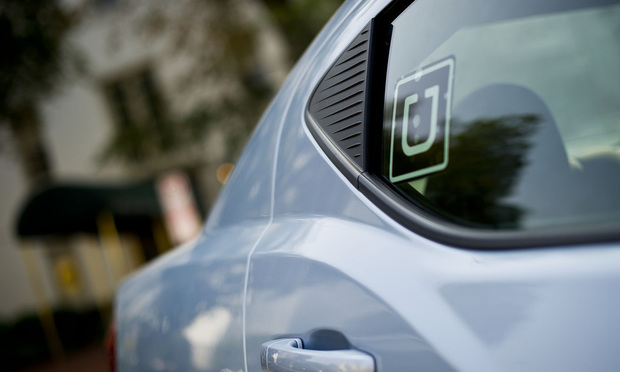Judge Hands Uber Win in Lyft Driver's Suit Over Hacked Mobile App
A U.S. magistrate judge in California dismissed claims that Uber violated the Stored Communications Act to transmit and collect Lyft driver data for a competitive edge.
September 27, 2018 at 04:57 PM
3 minute read
 Uber
Uber
In a victory for Uber, a federal judge Thursday dismissed claims brought by a Lyft driver alleging the company tracked his whereabouts for competitive edge, driving the final nail in the coffin in a class action struck earlier this year.
Presiding over the case in the U.S. District Court for the Northern District of California, federal magistrate judge Jacqueline Scott Corley sided with Uber in dismissing with prejudice a claim that the company violated the Stored Communications Act by using spyware to spam Lyft drivers with “fake ride requests” and intercept, access, monitor and transmit driver data. The dismissal joins three others on claims brought by plaintiff Michael Gonzales, repped by attorneys at Audet & Partners and Zimmerman Reed, effectively ending the class action.
Repping Uber in the lawsuit are attorneys from Shook, Hardy & Bacon, led by D.C.-based partner Patrick Oot, who was admitted pro hac vice. Oot didn't immediately respond to requests for comment, but his team argues in their August motion to dismiss that plaintiff's claims are “based mainly on an article [he] read online.”
“Though this case is supposedly about egregious conduct that seriously harmed former Lyft driver Michael Gonzales, like the first two complaints this one says virtually nothing about him. Was he harmed? How does he know he was harmed? “ they write.
In plaintiff's telling, Uber both created and deployed a spyware nicknamed “Hell,” which infiltrated Lyft's computer systems and servers to impersonate customers searching for rides via Lyft's mobile app. “Using Hell,” the July complaint states, “ Uber's employees, contractors, and/or agents were able to harvest the data transmitted by Lyft drivers, including their locations and Lyft ID's,” i.e. Social Security-like identification numbers that Uber used to track its competitor's drivers. This process, plaintiffs claimed, was repeated “millions of times” from 2014 to 2016 “to gain an unfair advantage in the marketplace.”
“Essentially, Uber was looking for overlap between its location data and Lyft's so that it could inundate drivers who used both platforms with work, encouraging drivers to use Uber's platform exclusively, and thus harm drivers who only used the Lyft platform,” plaintiff says. “By reducing the supply of Lyft drivers, Lyft customers saw increased wait times, which ultimately led Lyft-only drivers to experience decreased overall earnings, decreased earnings per fare, cancelled fares, and a decrease in the quantity of fares per shift.”
And the data “unlawfully accessed,” plaintiffs argued, fell under the SCA's definition of “electronic storage” — information stored by “for the purpose of backup protection of such communication” for purposes such as driver analysis, a viewpoint with which judge Corley disagrees.
“By Plaintiff's reading, all data stored by a corporation in more than one location would fall under the Stored Communications Act, regardless of the purpose of its storage,” Corley writes in a Wednesday order. “Plaintiff's view is clearly refuted by the plain text of subsection (B) [of the SCA], which covers only storage 'for the purpose of backup protection.”
Lawyers from Audet didn't immediately respond to requests for comment.
This content has been archived. It is available through our partners, LexisNexis® and Bloomberg Law.
To view this content, please continue to their sites.
Not a Lexis Subscriber?
Subscribe Now
Not a Bloomberg Law Subscriber?
Subscribe Now
NOT FOR REPRINT
© 2025 ALM Global, LLC, All Rights Reserved. Request academic re-use from www.copyright.com. All other uses, submit a request to [email protected]. For more information visit Asset & Logo Licensing.
You Might Like
View All

Lawyers Across Political Spectrum Launch Public Interest Team to Litigate Against Antisemitism
4 minute read
Jones Day Names New Practice Leaders for Antitrust, Business and Tort Litigation and Latin America

Supreme Court Denies Trump's Request to Pause Pending Environmental Cases
Trending Stories
- 1Investor Sues in New York to Block $175M Bitcoin Merger
- 2Landlord Must Pay Prevailing Tenants' $21K Attorney Fees in Commercial Lease Dispute, Appellate Court Rules
- 3Compliance with EU AI Act Lags Behind As First Provisions Take Effect
- 4NJ's Pardons and Commutations A Model for the Federal System
- 5As Political Retribution Intensifies, Look to Navalny's Lawyers
Who Got The Work
J. Brugh Lower of Gibbons has entered an appearance for industrial equipment supplier Devco Corporation in a pending trademark infringement lawsuit. The suit, accusing the defendant of selling knock-off Graco products, was filed Dec. 18 in New Jersey District Court by Rivkin Radler on behalf of Graco Inc. and Graco Minnesota. The case, assigned to U.S. District Judge Zahid N. Quraishi, is 3:24-cv-11294, Graco Inc. et al v. Devco Corporation.
Who Got The Work
Rebecca Maller-Stein and Kent A. Yalowitz of Arnold & Porter Kaye Scholer have entered their appearances for Hanaco Venture Capital and its executives, Lior Prosor and David Frankel, in a pending securities lawsuit. The action, filed on Dec. 24 in New York Southern District Court by Zell, Aron & Co. on behalf of Goldeneye Advisors, accuses the defendants of negligently and fraudulently managing the plaintiff's $1 million investment. The case, assigned to U.S. District Judge Vernon S. Broderick, is 1:24-cv-09918, Goldeneye Advisors, LLC v. Hanaco Venture Capital, Ltd. et al.
Who Got The Work
Attorneys from A&O Shearman has stepped in as defense counsel for Toronto-Dominion Bank and other defendants in a pending securities class action. The suit, filed Dec. 11 in New York Southern District Court by Bleichmar Fonti & Auld, accuses the defendants of concealing the bank's 'pervasive' deficiencies in regards to its compliance with the Bank Secrecy Act and the quality of its anti-money laundering controls. The case, assigned to U.S. District Judge Arun Subramanian, is 1:24-cv-09445, Gonzalez v. The Toronto-Dominion Bank et al.
Who Got The Work
Crown Castle International, a Pennsylvania company providing shared communications infrastructure, has turned to Luke D. Wolf of Gordon Rees Scully Mansukhani to fend off a pending breach-of-contract lawsuit. The court action, filed Nov. 25 in Michigan Eastern District Court by Hooper Hathaway PC on behalf of The Town Residences LLC, accuses Crown Castle of failing to transfer approximately $30,000 in utility payments from T-Mobile in breach of a roof-top lease and assignment agreement. The case, assigned to U.S. District Judge Susan K. Declercq, is 2:24-cv-13131, The Town Residences LLC v. T-Mobile US, Inc. et al.
Who Got The Work
Wilfred P. Coronato and Daniel M. Schwartz of McCarter & English have stepped in as defense counsel to Electrolux Home Products Inc. in a pending product liability lawsuit. The court action, filed Nov. 26 in New York Eastern District Court by Poulos Lopiccolo PC and Nagel Rice LLP on behalf of David Stern, alleges that the defendant's refrigerators’ drawers and shelving repeatedly break and fall apart within months after purchase. The case, assigned to U.S. District Judge Joan M. Azrack, is 2:24-cv-08204, Stern v. Electrolux Home Products, Inc.
Featured Firms
Law Offices of Gary Martin Hays & Associates, P.C.
(470) 294-1674
Law Offices of Mark E. Salomone
(857) 444-6468
Smith & Hassler
(713) 739-1250






